Do you capitalize on opportunities? Because more often than not, the best ones knock softly at our door and end up unrealized. 🤷♂️
But that’s not the case with Michael, founder of digital marketing agency Litebulb Media. The truth is that we were blown away by his success with our $1 trial at UpViral.
He used it to run a giveaway that generated:
- 7,982 landing page visits
- 1,337 social media shares
…Which resulted in a total of 3,100+ leads 🔥 for a client in the food industry.
This exceeded Michael’s expectations. Here’s what he told us:

The interesting part? He achieved this in less than a week ― 6.5 days to be exact! See the screenshot of Michael’s numbers:
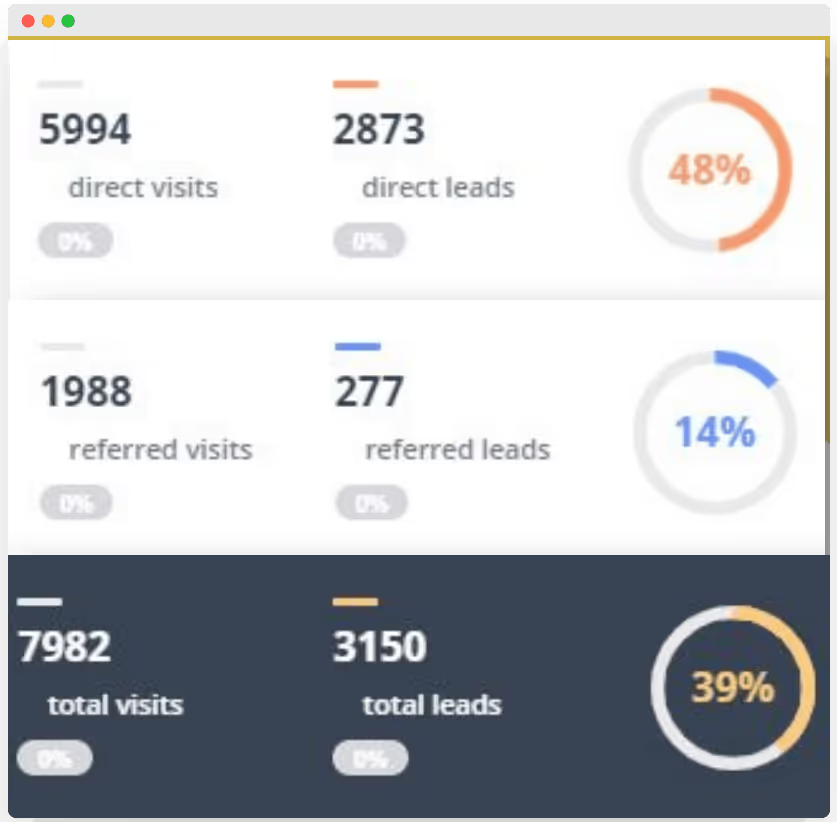
(NOTE: THE SCREENSHOT SHOWS 3150 LEADS SINCE MICHAEL SIGNED UP HIMSELF AS PART OF TESTING THE CAMPAIGN.)
So, our UpViral team decided to invite him as our special Co-Pilot Show guest and learn how he nailed his campaign.
Michael’s strategies and insights can be used by anyone who’s thinking of doing a giveaway to get leads and prospective customers whether for themselves or a client if they run an agency like Michael!
QUICK FACTS ABOUT THE GIVEAWAY:
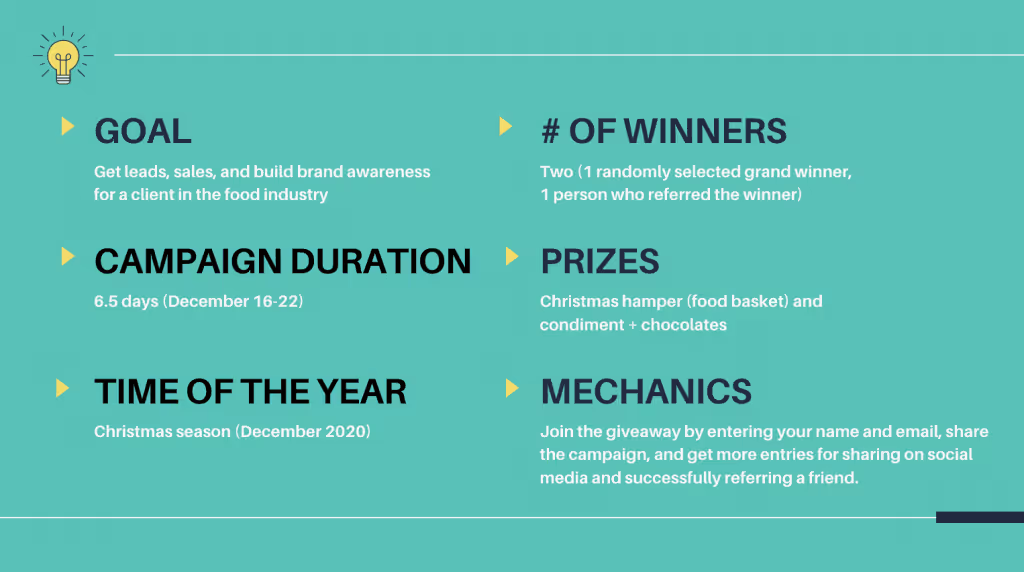
Before getting into the details, let’s learn a bit about the person behind this $1 trial SUCCESS. 👇
(Note: To maintain the anonymity of Michael’s client, we’ve used images that best represent the original images from the campaign.)
Who Is Michael Winter?
Michael Winter is a self-taught marketer who started Litebulb Media, a digital marketing agency that offers SEO, social media, and PPC services since 2017. He had worked in the construction industry for 10 years but wanted to do something creative so he started the agency.
Why Did Michael Decide to Use UpViral?
Michael collaborates regularly with a fellow agency called Market Jar, who had a client in the food industry — a company that sells meal kits that include ready-to-eat cured meats, cheeses, jams, and more.
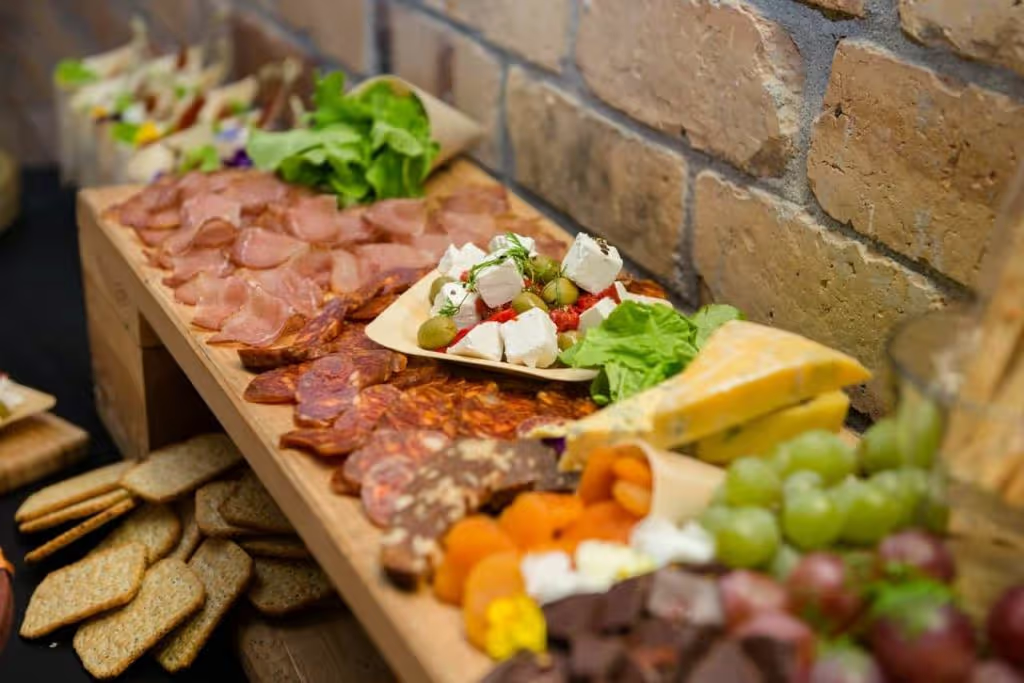
The client just launched their website in December 2020 and needed help with building brand awareness, getting leads, as well as some orders. However, they told Michael to not make the help “too good” to avoid mishandling a sales surge (since they were still new!)
We believe they launched at a perfect time knowing that meal kits are in high demand during the COVID-19 pandemic.
Due to his client’s request, Michael was concerned about controlling the influx of sales. To meet the client’s demand, he decided to run a giveaway using UpViral.
The giveaway served as a great solution because:
- It would grow the client’s email list from day 1.
- Michael would be able to send email campaigns to segments of the list. Instead of sending mass messages to everyone, he would send targeted emails that cater to their specific interests, behaviors, etc.
Elements of the Giveaway
To accomplish Michael’s goal, he used the following elements to structure his giveaway:
Prize
Michael used his client’s own product as the grand prize, a Christmas hamper (food basket), awarded to a winner. Not just that, but he also gave away a second smaller prize to another person who referred the winner.
🎁 GRAND PRIZE: Christmas hamper
🎁 REFERRER PRIZE: An Italian condiment and chocolates

Here’s why Michael thinks this prize strategy worked:
1. RELEVANT TO THE AUDIENCE.
Michael understood the importance of choosing a prize that attracted his client’s ideal prospects and customers. He cautions businesses against fancy popular prizes, for example, an iPad or MacBook, unless they sell these products.
Sure, fancy but irrelevant prizes attract tons of participants. But if your goal is to generate quality leads, you’ll want to use a prize that aligns with your business.
2. TANGIBLE
While doing his research, Michael learned that physical products work better than digital products as giveaway prizes.
However, for those businesses with digital products, they can offer a physical product alongside the digital product and create a “prize pack”. To decide on the best physical product, asking this question helps:

He cites a sleep app as an example, and suggests a memory foam or pillow or something closely related to complement the app.
In one of our case studies at UpViral, we had someone give away a phone as the grand prize since the phone complemented the mobile app he built. Here’s the link to that case study in case you want to check it out.
3. THE REFERRER WAS INCENTIVIZED
One of the best things that Michael did to increase the giveaway’s virality was incentivizing the person who referred the winner. He anticipated that some participants would hesitate to share the campaign for fear of their friends winning.
They might think, “the more people that enter the giveaway, the lower the chances of me winning.” So, Michael overcame that objection by also rewarding the winner’s referrer.
Timing
When structuring a giveaway, most people think about the prize but overlook the aspect of timing. Here’s why timing matters: Doing a giveaway during special occasions can give it higher visibility and an engagement boost.
This was what Michael did ― he took advantage of the festive holiday season. He launched the giveaway on the 16th of December, at midnight, and closed it on the 22nd which was also the winner announcement date.
The prizes were delivered to the two winners on the 23rd so they could enjoy them on Christmas eve. 🎄 After all, these prizes make great additions to holiday gatherings!
💎A tip from UpViral: Like Michael, make sure to end your giveaway days before the main occasion (in his case, Christmas eve). Otherwise, your audience might get too busy with preparations and forget your giveaway!
Landing Page
One thing that successful giveaways have in common is a well-designed landing page.
Before you start creating your landing page, spend some time thinking about the headline, prize description, form fields, and the rest of your landing page components.
They all work hand in hand to achieve a great landing page.
Michael hosted the landing page on UpViral. Here’s what it looks like. See the image below).
Again, the UpViral team made this image that closely resembles the original version to maintain the client’s anonymity.

Michael gave us a breakdown of the landing page elements he used and why each of them worked:
1. HEADLINE AND COPY
The headline “Christmas Giveaway” is concise and doesn’t beat around the bush. It connects with visitors the moment they read it.
Below the headline is a subheading that mentions what’s being offered as the prize and invites the audience to win it.
As you may have noticed, Michael kept the rest of the copy short. He omitted non-essential details. We liked how he indicated that the giveaway was free to join. He also emphasized the closing date and time using a different color to make it stand out.
According to Michael, he didn’t want to add too much copy and rather let the image do the talking. He also knew that big blocks of text would turn visitors off since most people scan than read line by line.
💎A tip from UpViral: Try adding marketing power words and phrases to boost the persuasiveness of your copy! Examples are free, now, and don’t miss out.
2. HOOK
To the left of the landing page is the image of the prize. Right above it, you’ll see a hook that you can use to grab your audience’s attention.
Michael’s hook was a note telling the audience that the winner would receive the prize on Christmas eve, delivered to their door.
3. IMAGE OF THE PRIZE
Michael created the prize image using a free tool called Canva. It’s a clear, visually appealing image. Michael draws attention to it with a huge note above it saying “WIN,” the name of the prize, and the hook.
4. FORM FIELDS (NAME AND EMAIL)
Anyone can easily enter the giveaway by typing their first name and email address. The first name field was especially important to Michael so he’d be able to send personable emails.
We also think that limiting the number of fields to 2 was a smart strategy. Because asking for too much information can oftentimes frustrate people and reduce the number of entries.
5. GDPR CHECKBOX
Below the form fields, Michael added a GDPR checkbox where entrants can give consent to receiving follow-up emails, updates, and discounts from Michael’s client.
Share Page
After entering their name and email, and clicking the call-to-action button “Enter Now,” participants were taken to a share page where they can start getting the word out about the giveaway.
Like the landing page, Michael kept the share page simple and skimmable. He made use of headings, colors, and underlined some texts for emphasis.
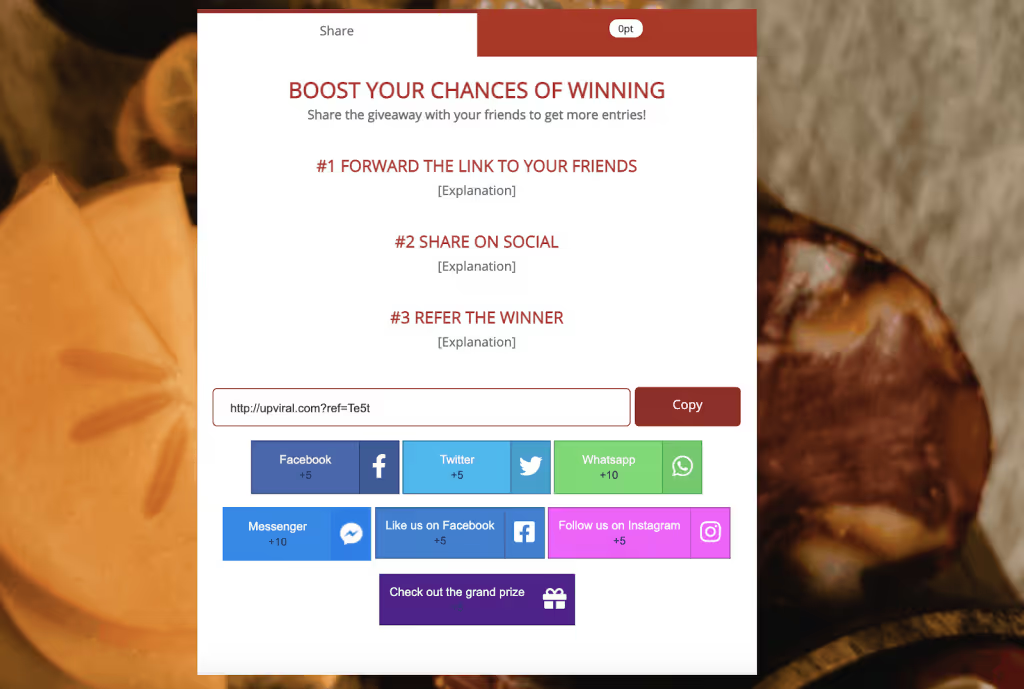
The main headline tells the audience that they can boost their chances of winning while the rest were specific steps on how to do it.
The overall design of the share page complemented the landing page to maintain unity and relevance.
While the landing page featured the grand prize, the share page mentions awarding a second prize to the person who referred the winner. See #3 Refer the Winner.
SOCIAL MEDIA SHARE BUTTONS
When it comes to adding social media buttons, he advises businesses to add only social media channels that you only want to grow for your company.
Doing this avoids the paradox of choice where people end up not choosing anything because of too many options.
In the campaign, Michael featured Facebook and Twitter and assigned 5 points (5 entries) to each.
However, he recommends adding WhatsApp and Messenger buttons on top of your preferred social media channels. These options allow participants to share the campaign one-on-one with their friends and family.
So, to motivate his client’s audience to share via these social media channels, he assigned 10 points to each of them.
SOCIAL SHARING APPEARANCE
This is what the campaign post looks like when shared on social media. See the Facebook post below:
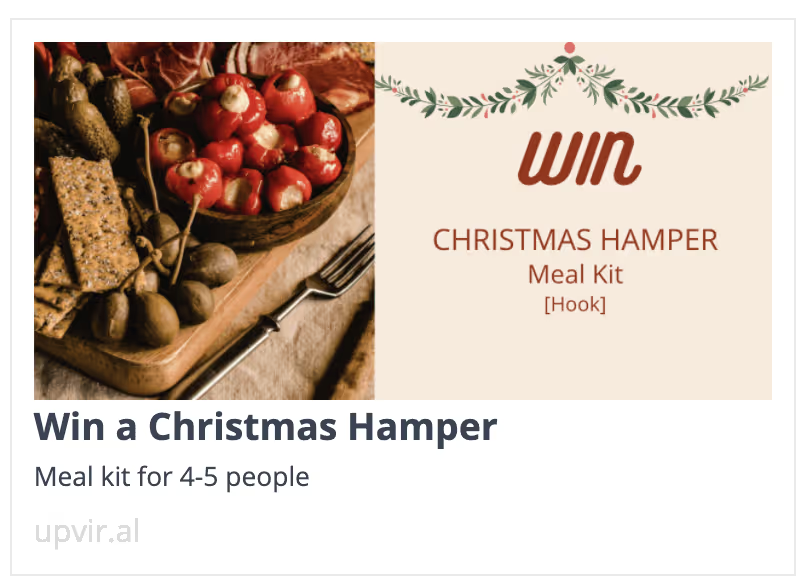
Using UpViral, you have the option to upload an image of your choice or design it using Canva.
The good news is that UpViral has integrated Canva so you can conveniently create your social graphics even if you don’t have a design team, as you can see from the screenshot below.
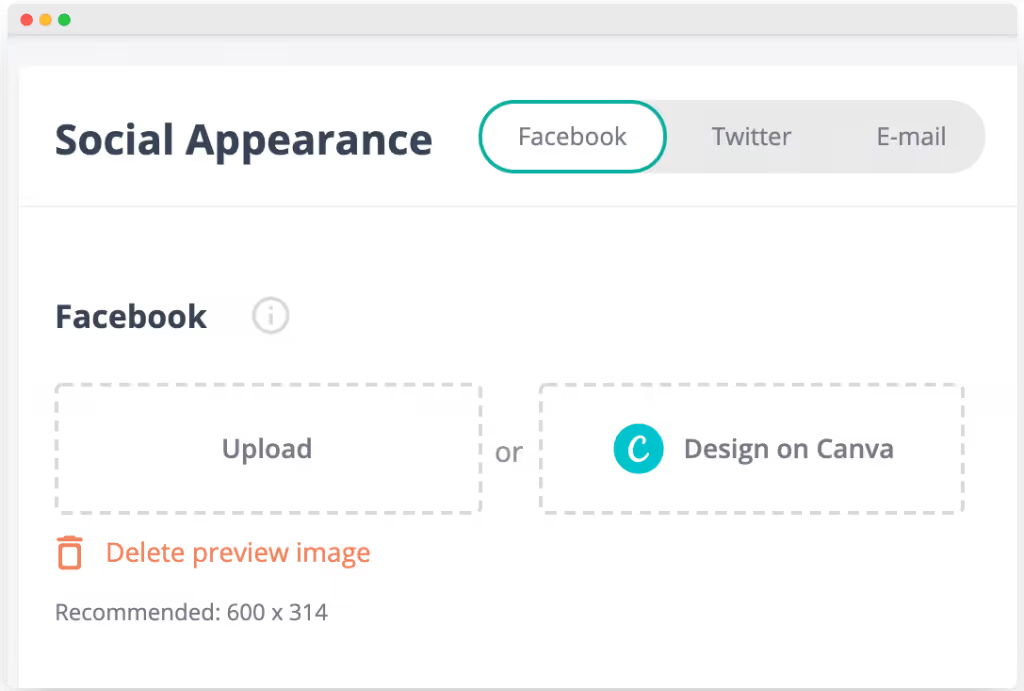
In Michael’s case, he used Canva.
CUSTOM ACTIONS
For the Custom Actions, Michael added the following buttons and assigned 5 points to each:
- Like our page on Facebook
- Follow us on Instagram
- Check out the Grand Prize
💎A tip from UpViral: If you use Custom Actions to meet additional goals for your business, such as growing your social media or understanding your audience better (through surveys), we recommend assigning more points for higher priority actions.
How Michael Promoted the Giveaway
Michael used the following marketing techniques to promote the giveaway:
- Running Facebook ads (traffic + likes campaign)
- Submitting the campaign to giveaway websites
- Posting on social media
Facebook Ads
Getting traction for a campaign can be challenging without an existing audience to promote it to.
Considering that his client had no audience on social media or even email subscribers, Michael thought that running Facebook ads would be a good solution to give the campaign an initial boost.
Michael mentioned that those who already have an existing audience may be able to achieve virality early in the campaign.
We also think that Facebook ads were a great option knowing that Michael only had less than a week to run the whole giveaway campaign.

TRAFFIC CAMPAIGN
Michael spent £210, about £30/day, on Facebook ads that sent traffic to the UpViral landing page. To get the most out of the campaign, Michael created variations of the ad.
For instance, he experimented with two different headlines while using the same ad copy and visual. He regularly checked the campaign’s performance and kept the ad that worked best.
Here’s what one of the ads looked like:
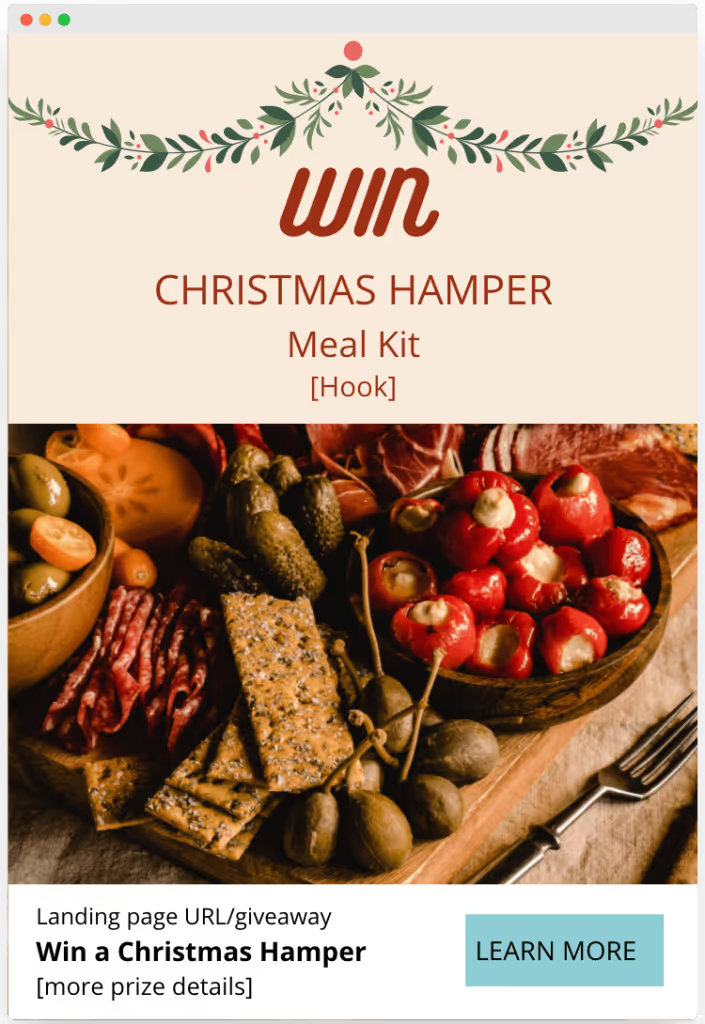
Result: The ad reached 10,996 people and the number of actions was 502.
Although the actions were not as many, Michael pointed out that his client’s company was still brand new, and that he was pleased that the ad reached almost 11,000 people which helped with the brand awareness goal.
“You want to get people to know, like, and trust you before they buy,” Michael said.
LIKES CAMPAIGN
Michael also spent an additional £50 for a “Likes” Facebook ad campaign to further increase the discoverability of the giveaway. The ad invited people to like the client’s Facebook page so they could find out how to enter the giveaway.
According to Michael, this campaign also increased the value of the organic posts on the client’s page.
Result: The ad reached 3,911 people and resulted in 265 page likes.
Giveaway Websites
Another strategy that helped Michael was posting the campaign on giveaway sites.
But before doing this, he did a lot of research to determine whether it was really worth doing since giveaway sites have “compers” or people who regularly enter competitions. These people are often not interested in your business and only in winning prizes.
Michael didn’t want to ruin his email list by attracting compers.
However, after considering the potential virality and sales that it could offer, he went ahead and added the campaign to 3 giveaway sites.
He also created a Bitly link to track the visits from these sites and compare them with those that came from the ads. (Alternatively, you can create custom tracking links inside UpViral!)

Michael recommends cleaning up your email list after the campaign to remove people who aren’t going to be interested in your products or services. “It’s going to be bad for your open rates and deliverability rates,” says Michael.
Later on, we’re going to show you how Michael cleaned his email list.
Social Media Posting
In addition, he put up a few posts on his client’s Facebook and Instagram pages that:
- Announced the giveaway
- Reminded people that they’ve only got a few hours left to enter
- Congratulated the 2 winners
All creatives were designed by Michael using Canva, which took him less than an hour.
Some Valuable Email Tips from Michael
Michael offers a couple of email marketing tips for giveaway campaigns:
1. TEST YOUR EMAIL SUBJECT LINES
He recommends split-testing your email subject lines since they can impact your email open rates. Here’s what he suggests:
Email 10% of your list two different subject lines. 5% of that list gets to read subject line A, while the other 5% reads subject line B. Give it 24 hours and after that check which subject line performs best. Use that for the remainder of your list.
2. CREATE A UNIQUE DISCOUNT CODE FOR GIVEAWAY ENTRANTS
To track the sales that resulted from the giveaway, Michael created a unique discount code. This was also a way of saying “Thank you” to everyone who participated.
Michael sent an email to the non-winners with the discount code so they can get 20% off on their next food order.
3. CLEAN UP YOUR EMAIL LIST
As mentioned previously, Michael recommends doing this to maintain a quality list and also to avoid bad signals (low deliverability and open rates).
The first email he sent after the giveaway explicitly asked for unsubscribes.
It said something like, “If you don’t want to keep receiving our emails, please feel free to unsubscribe. We understand that our products aren’t for everyone.”
At the bottom of the email was the unsubscribe button.
What Can Be Done Differently Next Time?
There is no perfect giveaway, and there’s always room for improvement! Here are things that Michael thinks can be improved for his future campaigns:
- Tell people that they get a discount just for entering the giveaway. Because in this campaign, the discount was offered only after the giveaway to non-winners.
- If Michael would run a longer campaign, he plans on incentivizing people with more points (through Custom Actions) in the middle of the campaign to keep the engagement and motivation up.
- Pre-qualify people through a questionnaire or feedback form. Answering this will also help them earn extra points.
- Add a food menu (PDF) as a Custom Action that people can download and go through to learn more about the business.
Why Was Michael’s Campaign Successful?
Overall, Michael nailed the campaign that he ran for his client using UpViral’s $1 trial. 😮Let’s take one last look at the results:
- 3,100+ leads (Michael said 100 entries would have been great already)
- 7,982 landing page visits (He originally hoped for just 1,000 visits)
- 1,337 social media shares
In addition, his client built brand awareness and grew their social media.
After cleaning up his client’s email list at the end of the giveaway, they were left with 2,808 leads who were interested in the business.
Michael believes the campaign worked for the following reasons:
#1 – The time of the year. Timing was an important aspect in this giveaway. Michael was able to position the prize well. The food hamper was promoted as something that can be enjoyed on Christmas eve which made it enticing.
#2 – Incentivizing the referrer. This increased participation as people were more motivated to share since doing it meant additional entries.
#3 – Facebook ad targeting. Michael mentioned that his ads were also well-targeted. They gave the campaign a boost especially that his client started with zero audience.
#4 – Accountability. With only a week to run the campaign, Michael held himself accountable. This is key for everyone who wants their campaign to succeed, especially with the $1 trial opportunity at UpViral.
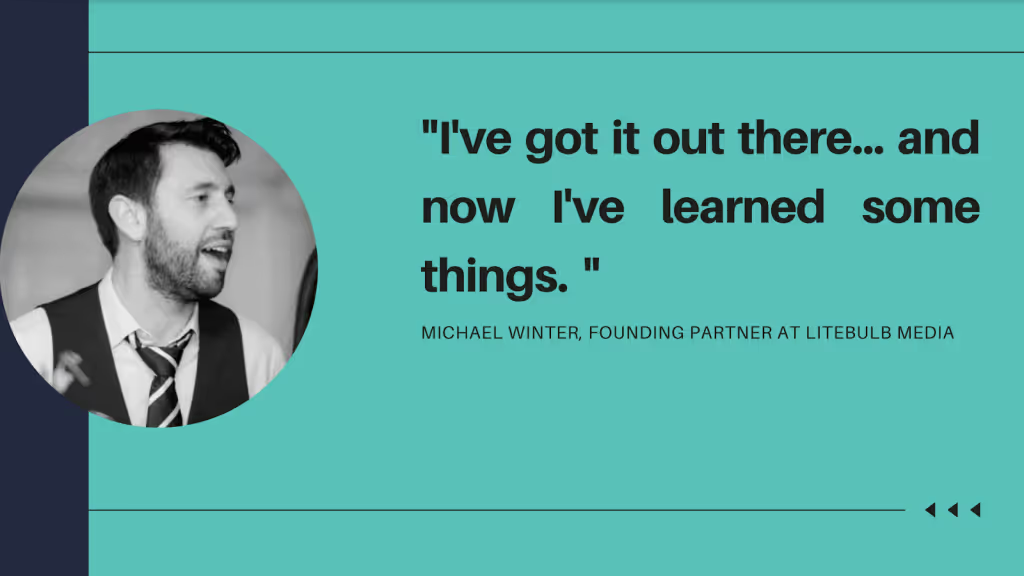
Final Thoughts
What the UpViral team loves about Michael’s campaign is that it teaches us that opportunity + action gets results. 3,100+ leads in less than a week, on UpViral’s $1 trial, is an awesome accomplishment. 💪 You can do this for your business or a client’s business just like Michael!
Thank you for reading this case study. We hope you’ve enjoyed and learned something new. And if you’re ever interested in Michael’s work — particularly his upcoming course and coaching services — feel free to find out more at Litebulb Media.














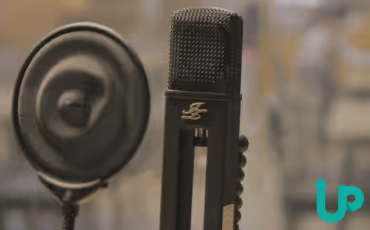
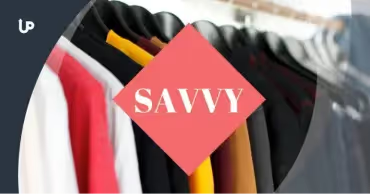
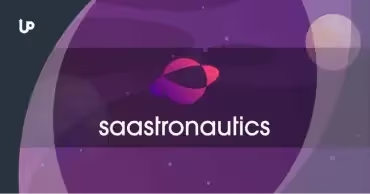
.png)